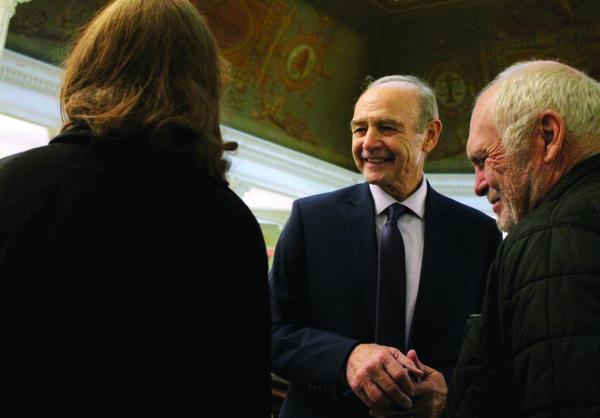December 13, 2018

Former Speaker Sal DiMasi, at center, back at the State House on Dec. 4.
SHNS photo
Two years after his battle with cancer resulted in a shortened prison term, former House Speaker Salvatore DiMasi is stepping back into the public eye, offering harsh criticism of the federal Bureau of Prisons and indicating a desire to be an advocate for the better treatment of prisoners.
The former North End politician said last week that the cancer that led to his “compassionate release” from federal prison was in remission. He also said that the Federal Bureau of Prisons operated like a “rogue, rogue agency.”
DiMasi’s comments came during his first public interview since a federal judge allowed him to be released from prison due to his declining health after he served five years of an eight-year sentence for public corruption. He returned home to Boston from a North Carolina prison last November.
“My health is much, much better. I’m in remission. I’m lucky,” DiMasi told WGBH’s Jim Braude during an interview on “Greater Boston,” which aired last week.
DiMasi said he had been battling both throat and prostate cancer, and backed up his wife, Debbie DiMasi, who had publicly advocated for her husband’s release, saying he was being denied medically necessary treatment in prison.
“It’s systemic with the organization. The Bureau of Prisons does not provide the health care needed, not just for me, but for anybody,” DiMasi said.
The former legislator had been back on Beacon Hill a day earlier where current House members had gathered to listen to their colleagues who will not be returning next year give farewell speeches. DiMasi said he was “nervous” to return to the building where he had held sway for almost five years as speaker, but he was also humbled by the reception he received. Members applauded after House Speaker Robert DeLeo, DiMasi’s successor, introduced his predecessor, a floor guest of the House.
DiMasi spent 30 years in the House, and served as speaker from 2004 until his resignation in 2009 under a cloud of suspicion. In 2001, he was convicted for his role in a scheme to steer almost $18 million in state contracts to the Burlington software company Cognos in exchange for $65,000 in kickbacks concealed as payments from his law associate.
DiMasi did not want to discuss the charges or his trial in the interview, but struck a somewhat defiant note when he said it could be difficult for public officials to always see the “bright line…I spent probably the last 10 years trying to put all of that in the past,” he said. “I did the best I could under the circumstances presented to me and I tried to comply with the law.”
Asked if he thinks he broke the law, DiMasi said, “The complications of my case still need to be discussed as to what the merits were. That is in the past and I understand how people might see that differently than I would,” he added.
During his career, DiMasi fought to preserve gay marriage and keep casinos out of Massachusetts. He also played a significant role in writing the universal health care law that became the model for the Affordable Care Act and he worked with former Gov. Deval Patrick to pass landmark climate change legislation and a $1 billion investment in life sciences.
“You can try to taint the good-deed doer, but you can never taint the good deed,” DiMasi said.
Looking back, he said that for a time he thought he would die in prison. And while he said he thinks he got what he deserved with a “compassionate release” and not special treatment, DiMasi said he was “disgusted” with how the federal prison system handled other prisoners’ requests for medical release.
DiMasi said he was grateful that his case helped create momentum for the issue, but doesn’t want to stop there. “Am I dedicated right now to make sure that I can try to change prison reform, that I can try to change compassionate release, health care for prisoners, the criminal justice system. Yeah, I’m going to work on that. I’ll speak on it anywhere I can,” he said.


